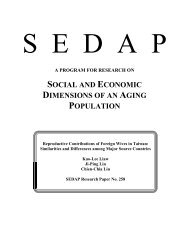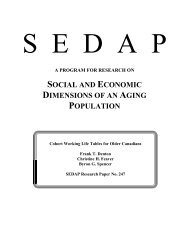working life of women seventeenth century - School of Economics ...
working life of women seventeenth century - School of Economics ...
working life of women seventeenth century - School of Economics ...
You also want an ePaper? Increase the reach of your titles
YUMPU automatically turns print PDFs into web optimized ePapers that Google loves.
INTRODUCTORYEffect <strong>of</strong> environment on Women's development. Possiblc reaction on men's deveiopment-Importance<strong>of</strong> <strong>seventeenth</strong> <strong>century</strong> in historic development <strong>of</strong> English<strong>women</strong>-Influence <strong>of</strong> economic position-Division <strong>of</strong> Women's productivepowers Into Domestic, Industrial, and Pr<strong>of</strong>esaiond-Three systems <strong>of</strong> IndustrialOrganisation-Domestic Industry-Family Industry-Capitalistic Induatryor 1ndustrialisn1-Definition <strong>of</strong> these terms-Historic sequence. Effect <strong>of</strong>Industrial Revolution on Women-in capitalistic class-in agr;culture-intextile industries-in crafts and other trades. Transference <strong>of</strong> productiveindustry from married <strong>women</strong> to unmarried <strong>women</strong>-with consequent increase<strong>of</strong> economic independence for the latter and its loss for theformer. Similarevolution in pr<strong>of</strong>essions shows this was not due wholly to effect <strong>of</strong> capitalism.HITHERTO the historian has paid little attention tothe circumstances <strong>of</strong> <strong>women</strong>'s lives, for <strong>women</strong> havebeen regarded as a static factor in social developments,a factor which, remaining itself essentially the same,might be expected to exercise a constant andunvarying influence on Society.This assumption has however no basis in fact, forthe most superficial consideration will show howpr<strong>of</strong>oundly <strong>women</strong> can be changed by their environment.Not only do the <strong>women</strong> <strong>of</strong> the same raceexhibit great differences from time to time in regardto the complex social instincts and virtues, but eventheir more elemental sexual and maternal instinctsare subject to modification. While in extreme casesthe sexual impulses are liable to perversion, it sometimeshappens that the maternal instinct disappearsaltogether, and <strong>women</strong> neglect or, like a tigress incaptivity, may even destroy their young.These variations deserve the most careful examination,for, owing to the indissoluble bond unitingthe sexes, and the emotional power which <strong>women</strong>exert over men, the character <strong>of</strong> men's development








